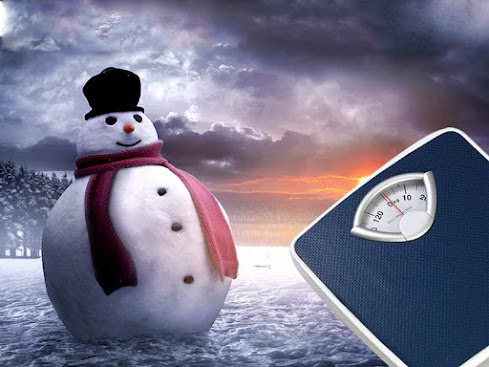Winter weight gain is a common complaint of many people, it seems that we gain a few pounds every winter and when summer comes we stop losing them, some of them always stay in place which makes us a little heavier every year makes. It seems like losing extra pounds is very difficult! Why is this happening and what can we do?
There are many factors that contribute to this: First, we likely have a genetic make-up to store more fat when winter approaches, which many animals do. This was probably vital for our ancestors to survive. The extra layers of fat in the body protect us from the cold and can then be used as fuel in late winter and early spring, when food reserves have historically been very low. a tendency to eat more in the fall when there is plenty of post-harvest food to aid this process.We may also unconsciously choose foods with a higher fat content at this point.
Hormone levels can also affect our weight gain. The interaction of hormones and other chemicals in the brain can cause appetite fluctuations and cravings. Some neurotransmitters can also affect weight gain. People who are overweight often have low levels of these neurotransmitters, and the consequences can be excessive appetite, depression, and difficulty sleeping. At the same time, the lack of natural light caused by the shortening of the days in late fall and winter can lead to seasonally influenced clutter or winter blues. One of the quickest ways to boost energy levels and emotions is to eat high-carb foods like sugar candies, potato chips, and granola, which give us a quick blood sugar correction. Low in winter tends to overeat or eat the wrong foods, leading to weight gain, more depression, and a vicious cycle that is difficult to break.
Taken together, there are many reasons why we eat more high-carb foods like cookies, cakes, and chocolate during the winter, and of course most of these foods are high in fat too. They're also high in carbohydrates so we can get what our bodies need, but they're low in fat and high in fiber, so potatoes, whole grain bread without butter, brown rice, granola, and whole fresh fruit.
Do more exercises. Our physical activity often decreases in winter and we tend to stay home and rest. This is of course when it's cold outside. But we are not cavemen! We have heating in our houses and we can be sure that there will be enough food in the shops from February onwards. We don't have to accumulate as much fat as they did. Join a gym or get an exercise bike to study with.Turn those carbs into energy now instead of keeping them on your waistline until spring. In this way, weight gain in winter can easily be avoided.

